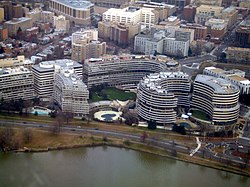
Back مجزرة ليلة السبت Arabic Saturday Night Massacre German Masacre del sábado por la noche Spanish Massacre du samedi soir French 土曜日の夜の虐殺 Japanese 토요일 밤의 학살 Korean Masakra sobotniej nocy Polish Massacre de Sábado à Noite Portuguese Masakr subotnje večeri Serbo-Croatian
| Watergate scandal |
|---|
 |
| Events |
| People |
The "Saturday Night Massacre" was a series of resignations over the dismissal of special prosecutor Archibald Cox that took place in the United States Department of Justice during the Watergate scandal in 1973.[1] The events followed the refusal by Cox to drop a subpoena for the Nixon White House tapes at President Richard Nixon's request.
During a single evening on Saturday, October 20, Nixon ordered Attorney General Elliot Richardson to fire Archibald Cox; Richardson refused and resigned effective immediately. Nixon then ordered Deputy Attorney General William Ruckelshaus to fire Cox; Ruckelshaus refused, and also resigned. Nixon then ordered the third-most-senior official at the Justice Department, Solicitor General Robert Bork, to fire Cox. Bork carried out the dismissal as Nixon asked.[2] Bork stated that he intended to resign afterward, but was persuaded by Richardson and Ruckelshaus to stay on for the good of the Justice Department.[3][4]
The political and public reactions to Nixon's actions were negative and highly damaging to the president. The impeachment process against Nixon began ten days later, on October 30, 1973. Leon Jaworski was appointed as the new special prosecutor on November 1, 1973,[5] and on November 14, 1973, United States District Judge Gerhard Gesell ruled that the dismissal had been illegal.[6][7] The Saturday Night Massacre marked the turning point of the Watergate scandal as the public, while increasingly uncertain about Nixon's actions in Watergate, were incensed by Nixon's seemingly blatant attempt to end the Watergate probe, while Congress, having largely taken a wait-and-see policy regarding Nixon's role in the scandal, quickly turned on Nixon and initiated impeachment proceedings that would end in Nixon's resignation.
- ^ Andrews, Evan. "What Was the Saturday Night Massacre?". HISTORY. Retrieved May 13, 2020.
- ^ "A Brief History Of Nixon's 'Saturday Night Massacre'". NPR.org. Retrieved May 13, 2020.
- ^ "Bork: Nixon Offered Next High Court Vacancy in '73". Yahoo News. ABC News. February 25, 2013. Archived from the original on March 1, 2013.
- ^ Noble, Kenneth B.; Times, Special To the New York (July 2, 1987). "Bork Irked by Emphasis on His Role in Watergate". The New York Times. ISSN 0362-4331. Retrieved May 13, 2020.
- ^ "Attorney General, Prosecutor Picked". The Argus-Press. Associated Press. November 1, 1973.
- ^ Cite error: The named reference
noblewas invoked but never defined (see the help page). - ^ Nader v. Bork, 366 F. Supp. 104 (D.D.C. 1973)
© MMXXIII Rich X Search. We shall prevail. All rights reserved. Rich X Search